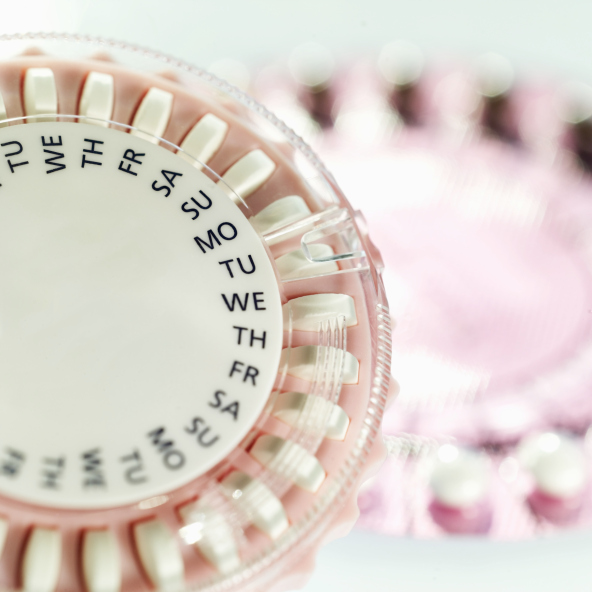 The birth control pill was created in 1960 as a way for women to control their menstrual cycle, help alleviate hormonal imbalance symptoms and, of course, to prevent pregnancy.
The birth control pill was created in 1960 as a way for women to control their menstrual cycle, help alleviate hormonal imbalance symptoms and, of course, to prevent pregnancy.
These small pills, loaded with progesterone and/or estrogen, work together to prevent ovulation (the monthly release of an egg from the ovaries to the uterus where it prepares for fertilization). The pill also makes the lining of the uterus unreceptive to the implantation of a fertilized egg (necessary to get pregnant).
Types of Birth Control Pills
- Progestin-only Pills: They contain no estrogen and are ideal for women who have just given birth.
- Combination Pills: The most common form of oral contraceptive. Most packages contain three weeks of hormone pills and one week of sugar pills (or spacer pills). They come in two different doses: monophasic and multiphasic.
- Monophasic: These pills contain a level amount of progesterone and estrogen, meaning side effects are minimal.
- Multiphasic: These pills contain three different doses of hormones, changing every seven days. They were designed to reduce side effects like breakthrough bleeding and spotting.
- Emergency Contraceptive Pills: These are designed to prevent pregnancy after unprotected sex. A good example is Plan B.
- Extended-cycle pills. These are typically dispensed in 13-week cycles. You take active pills for 12 weeks. During the last week of the cycle, you can take or skip the inactive pills and have your period. As a result, you have your period only three to four times per year.
RELATED: Getting Pregnant After Birth Control
What Are The Benefits Of Birth Control Pills?
Generally, taking the pill is simple, safe, and convenient. It does not interfere with having sex. Many women say it improves their sex lives because it helps them feel more spontaneous.
Women who do not need birth control often choose to take the pill for the other benefits it offers. In particular, combination and progestin-only pills can:
- Reduce menstrual cramps
- Make periods lighter
- Offer some protection against pelvic inflammatory disease, which often leads to infertility when left untreated.
The combination pill offers many additional benefits, including some protection against:
- Acne
- Bone thinning
- Breast growths that are not cancer
- Ectopic pregnancy
- Endometrial and ovarian cancers
- Serious infection in the ovaries, tubes, and uterus
- Iron deficiency anemia
- Cysts in the breasts and ovaries
- Premenstrual symptoms, including headaches and depression
- Bad cramps
- Heavy and/or irregular periods
The Pill: Protects Against Pregnancy, Not HIV
Women take the pill by mouth to prevent pregnancy, and when taken correctly, is up to 99.9% effective. However, the pill does not protect against sexually transmitted diseases, including HIV (the virus that causes AIDS). The latex male condom provides the best protection from most STDs.
How Does Hormonal Contraception Work?
Normally a woman becomes pregnant when an egg released from her ovary (the organ that holds her eggs) is fertilized by a man's sperm. The fertilized egg attaches to the woman's womb (uterus), where it receives nourishment and develops into a baby. Hormones in the woman's body control the release of the egg from the ovary and prepare the body to accept the fertilized egg.
Hormonal contraceptives (the pill, the patch, and the vaginal ring) all contain a small amount of synthetic estrogen and progestin hormones. These hormones work to inhibit the body's natural cyclical hormones to prevent pregnancy. Pregnancy is prevented by a combination of factors. The hormonal contraceptive usually stops the body from releasing an egg from the ovary. Hormonal contraceptives also change the cervical mucus to make it difficult for the sperm to find an egg. Hormonal contraceptives can also prevent pregnancy by making the lining of the womb inhospitable for implantation.
Extended-cycle pills contain the same hormones as other birth control pills, but they are taken in a longer cycle to reduce the number of yearly menstrual periods from 13 periods a year to only four periods a year. Therefore, women menstruate only once each season.
How Are Birth Control Pills Packaged?
You will receive a set of pills packaged in a thin case. Pill packs contain either 21 or 28 pills. Twenty-one-day pill packs contain 21 active pills. Twenty-eight-day pill packs contain 21 active pills and seven inactive pills. The pill packs are marked with the days of the week to remind you to take a pill every day. The seven inactive pills in the 28-day pill pack are added so that you are reminded to start a new pill pack after 28 days.
Extended-cycle pills contain 84 active pink tablets and seven inactive white pills.
How Do I Begin Birth Control Pills?
Ask your doctor when you should start birth control pills. If you still have your period on the day that you have been told to start your pill pack, go ahead and start the pill pack. You will get your next period about 25 days after starting the pill pack.
It's best to take the pills at the same time every day. Take the pill each day either before breakfast or at bedtime.
Extended-cycle pills work similarly. You begin taking it the first Sunday after your period. If your period starts on a Sunday, start the pill that day. Then you take one of the active tablets a day for 84 consecutive days. This is followed by seven days of placebo (inactive) pills.
When Do I Start Another Birth Control Pill Pack?
You will start each new birth control pill pack on the same day of the week that you initially started it. If you are on the 21-day pill pack, start the new pill pack seven days after you finished the old pill pack. If you are on the 28-day pill pack, begin the new pack after taking the last pill in the old pack.
Start your new pill pack as scheduled above, whether or not you get your period or are still having your period.
How Soon Do Birth Control Pills Work?
When taken as directed, birth control pills are usually effective the first month you begin taking them. To be safe, some doctors recommend the use of another form of birth control, such as condoms and foam, during the first month. After the first month, you can just use the pill for birth control.
What If I Forget to Take a Birth Control Pill?
If you forget to take a birth control pill, take it as soon as you remember. If you don't remember until the next day, go ahead and take two pills that day. If you forget to take your pills for two days, take two pills the day you remember and two pills the next day. You will then be back on schedule. If you miss more than two pills, call your doctor. You may be told to take one pill daily until Sunday and then start a new pill pack or to discard the rest of the pill pack and start over with a new pack that same day.
Any time you forget to take a pill, you must use another form of birth control until you finish the pill pack. When you forget to take a pill, you increase the chance of releasing an egg from your ovary. However, if you forget to take any of the last seven out of the 28-day pills, you will not raise your chance of pregnancy since these pills contain only inactive ingredients. If you miss your period and have forgotten to take one or more active pills, get a pregnancy test. If you miss two periods even though you have taken all your pills on schedule, you should get a pregnancy test.
RELATED: Is It Safe? Birth Control Dangers Every Woman Should Know
Are There Side Effects of Birth Control Pills?
Yes, there are side effects of birth control pills, and the majority of them, including the ones below, aren't serious:
- Nausea
- Weight gain
- Sore or swollen breasts
- Small amount of blood, or spotting, between periods
- Lighter periods
- Mood changes
Some birth control pill side effects, however, are much more serious. If you experience any of these, contact your doctor immediately. If you cannot reach your doctor, go to an emergency room or urgent care center for evaluation. These symptoms may indicate a serious disorder, such as liver disease, gallbladder disease, stroke, blood clots, high blood pressure, or heart disease, including:
- Abdominal pain (stomach pain)
- Chest pain
- Headaches (severe)
- Eye problems (blurred vision)
- Swelling and/or aching in the legs and thighs
Can Any Woman Take Birth Control Pills?
Birth control pills can be taken safely by most women, but are not recommended for women who are over the age of 35 and smoke. If you don't smoke, you can use hormonal contraceptives until menopause. In addition, you should not take hormonal contraceptives if you have had:
- Blood clots in the arms, legs, and lungs
- Serious heart or liver disease
- Cancer of the breast or uterus
If you are not sure if you are affected by one of these conditions, ask your doctor. Also, inform your doctor if you have a first-degree relative (parent, brother, sister, child) who has had blood clots in the legs or lungs.
Is it OK to Take Other Drugs While Taking Birth Control Pills?
Some drugs can reduce the effectiveness of birth control pills. Tell your doctor about all of the medicines and over-the-counter agents (including herbs) that you are taking.
Points to Keep in Mind When Taking Birth Control Pills
- Keep another form of birth control, like spermicidal foam and condoms, on hand in case you forget to take a pill.
Carry your pills with you if you don't always sleep at the same place. - Take your pill at the same time every day. If you are using the patch, replace your patch weekly on the same day. If you are using the vaginal ring, remove it after three weeks of use.
- Get your refills soon after you start the last prescription. Don't wait until the last minute to request refills.
- Birth control pills, patches, and vaginal rings are all medications. Always tell your doctor or pharmacist you are on the pill, patch, or vaginal ring if you see him or her for any reason.
Questions To Ask Before Going On The Pill
- Are you the type of person who can remember to take a pill every day? (Oral contraceptives are only effective when taken consistently.)
- Will you consider also using condoms?
- Why are you looking to take birth control pills? Primarily to prevent pregnancy or to find relief from endometriosis or severe premenstrual syndrome?
- Are you a smoker?
- Will occasional spotting and bleeding bother you or interfere with your sex life?
- Do you have high blood pressure?
- Are you prone to anxiety attacks or hypertension?
- Will taking birth control pills decrease the effectiveness of any medications you are taking or will any medication you are on decrease the effectiveness of your birth control pills?
- Oral contraceptives are an effective method of preventing pregnancy, but birth control pills aren't appropriate for every woman. Talk to your doctor about all of your birth control options to determine which method is right for you.









